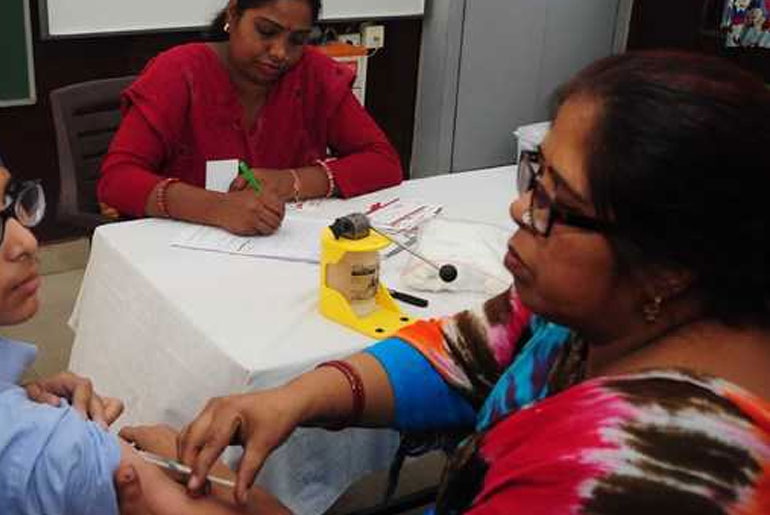Measles prevention through widespread vaccination programs has been instrumental in saving over 50 million lives in the last two decades. Despite significant progress, occasional outbreaks persist in areas with low vaccination rates, particularly among unvaccinated children. Measles remains one of the most highly contagious and potentially fatal diseases. However, the encouraging news is that it is preventable through effective vaccination initiatives. The decline in global measles cases since the 1980s, from as many as 4 million annually to just a few hundred thousand in the early 2020s, is largely attributed to the success of vaccination programs. The World Health Organization (WHO) underscores the vital role of sustained vaccination efforts in continuing to control and eventually eradicate this preventable disease.
Indeed, measles persists due to gaps in vaccination coverage, particularly among children. The World Health Organization (WHO) emphasizes that outbreaks occur where individuals, especially children, remain unvaccinated. Given the highly contagious and potentially fatal nature of measles, prevention through vaccination is considered the most effective strategy. Unfortunately, the global efforts to combat measles have faced challenges, especially during the COVID-19 pandemic, which disrupted routine vaccination programs. The US Centers for Disease Control and Prevention (CDC) reported a substantial number of postponed or missed measles vaccine doses, totaling about 61 million during the first two years of the pandemic.
Consequently, there has been a spike in measles cases, contributing to an estimated 128,000 deaths in 2021, primarily affecting unvaccinated or inadequately vaccinated children under the age of 5. These numbers underscore the critical importance of maintaining and strengthening vaccination programs to control and eventually eliminate preventable diseases like measles.
Measles is a highly contagious viral infection caused by the measles virus. It primarily affects the respiratory system but can lead to severe complications, including pneumonia, diarrhea, blindness, deafness, brain damage, and, in some cases, death. Measles is preventable through vaccination, and the World Health Organization (WHO) recommends a two-dose measles vaccine, often administered in combination with mumps and rubella vaccines (MMR).
Who is most at risk:
- Children: Measles is most common in children, particularly those who are unvaccinated or under-vaccinated.
- Refugees and Displaced Populations: Those living in crowded or unsanitary conditions, such as refugees or internally displaced people, are at a higher risk due to limited access to healthcare and vaccination services.
- Areas of Conflict: Measles outbreaks can occur in regions affected by conflicts or natural disasters, disrupting routine healthcare services and vaccination programs.
- Declining Vaccination Rates: Populations with declining vaccination rates are more susceptible to measles outbreaks, as demonstrated by the rise in cases in various regions.
The consequences of measles can be severe, as seen in the mentioned complications. The disease can be particularly devastating in areas with compromised healthcare infrastructure.
Measles Outbreaks in 2023:
- The WHO and CDC reported a significant increase in measles-related deaths in 2023, with a 40% rise.
- Epidemics occurred in 37 countries, affecting 9 million children and resulting in 136,000 deaths, primarily in poorer countries.
- Measles cases in Europe rose sharply to over 42,000, a 45-fold increase compared to the previous year.
Transmission and Prevention:
- Measles spreads through respiratory droplets from coughs and sneezes and can remain contagious in the air and on surfaces for up to two hours.
- The measles vaccine, often administered as the MMR jab, is a highly effective preventive measure. The WHO recommends two doses to ensure immunity.
Treatment:
- There is no specific treatment for measles, as it is a viral infection.
- Patients are advised to rest, stay hydrated, and may take painkillers if necessary.
- Antibiotics are not effective against the measles virus and are only prescribed for secondary bacterial infections.
- Misuse of antibiotics contributes to antimicrobial resistance, emphasizing the importance of appropriate antibiotic use.
In summary, vaccination remains a key strategy to prevent measles, and efforts to maintain high vaccination coverage globally are crucial in controlling and eliminating the disease. Additionally, addressing social and healthcare factors in vulnerable populations is essential to reduce the risk of outbreaks and complications.
Disclaimer:
The information contained in this article is for educational and informational purposes only and is not intended as a health advice. We would ask you to consult a qualified professional or medical expert to gain additional knowledge before you choose to consume any product or perform any exercise.







